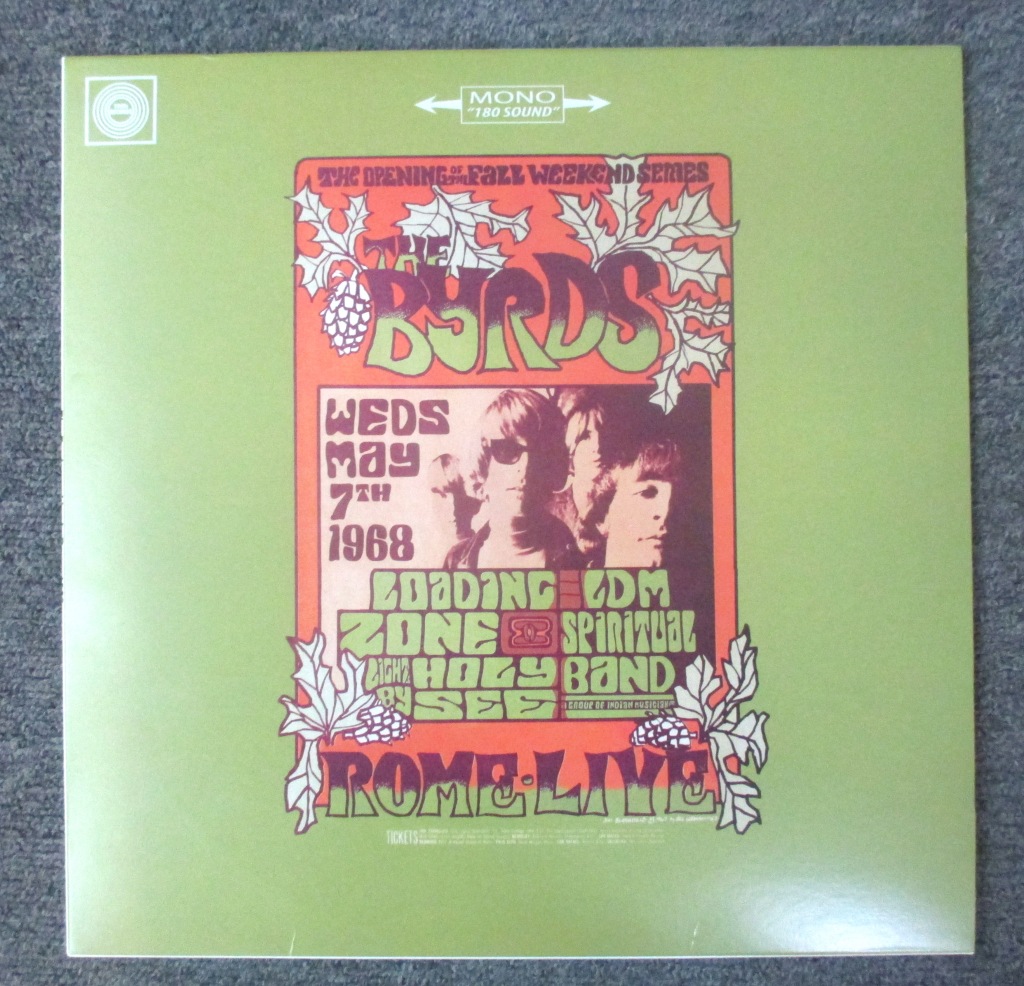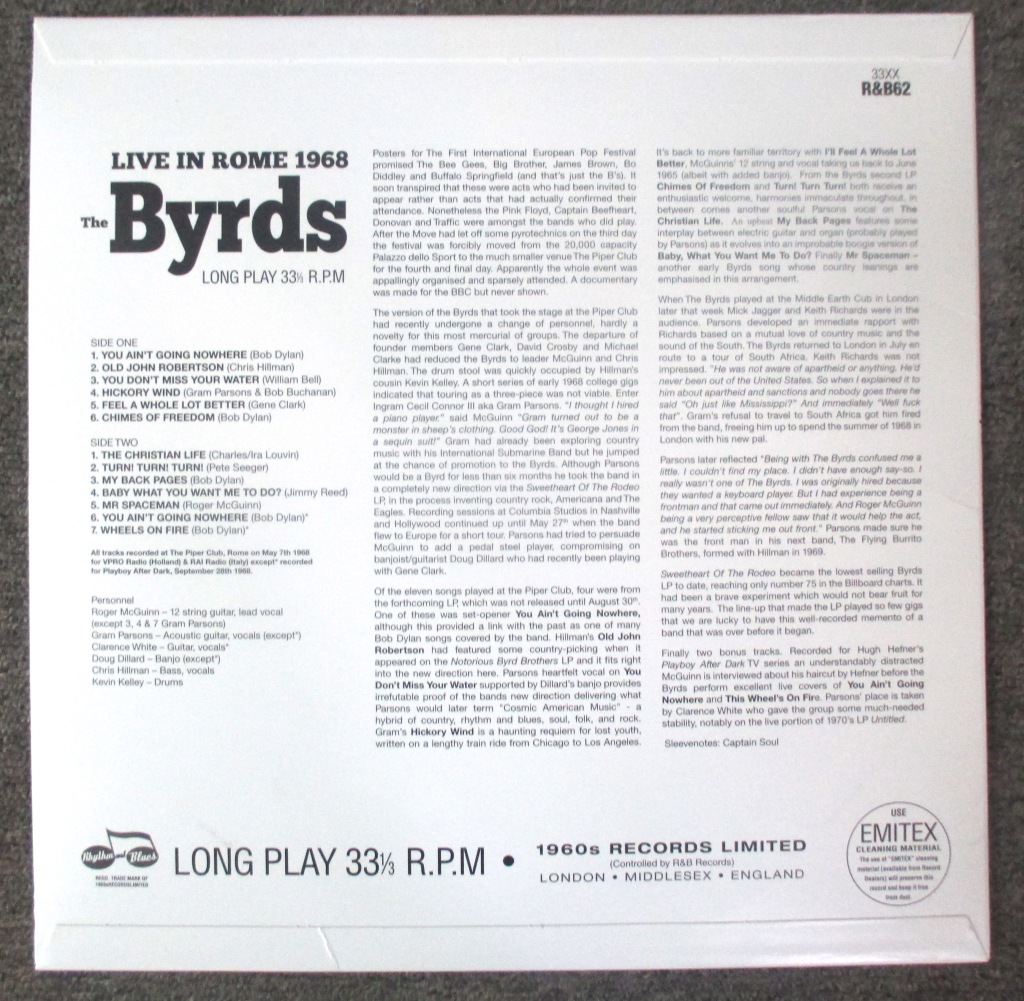New Vinyl Release: The Byrds Live Rome 1968
Available now from http://www.1960s.london

Side One
- You Ain’t Going Nowhere (Bob Dylan)
- Old John Robertson (Chris Hillman)
- You Don’t Miss Your Water (William Bell)
- Hickory Wind (Gram Parsons and Bob Buchanan)
- I’ll Feel A Whole Lot Better (Gene Clark)
- Chimes Of Freedom (Bob Dylan)
Side Two
7. The Christian Life (Charles and Ira Louvin)
8. Turn! Turn! Turn! (Pete Seeger)
9. My Back Pages (Bob Dylan) /
10. Baby What You Want Me To Do? (Jimmy Reed)
11. Mr Spaceman (Roger McGuinn)
12. You Ain’t Going Nowhere (Bob Dylan)
13. This Wheel’s On Fire (Bob Dylan)
Tracks 1-11 recorded at The Piper Club, Rome on May 7th 1968 for VPRO radio (Holland) with assistance from RAI radio (Italy)
Tracks 12 & 13 recorded for Playboy After Dark, September 28th 1968
Personnel
Roger McGuinn – Lead 12 string guitar, lead vocal, harmony vocal
Chris Hillman – Bass, harmony vocal
Gram Parsons – Acoustic guitar, harmony vocal, lead vocal (1-11)
Kevin Kelley – Drums
Doug Dillard – Banjo (1-11)
Clarence White – Guitar, harmony vocal (12 & 13)
John York – Bass (12 & 13)
Gene Parsons – Drums (12 & 13)
Sleevenotes
Posters for The First International European Pop Festival promised The Bee Gees, Big Brother, James Brown, Bo Diddley and Buffalo Springfield (and that’s just the B’s). It soon transpired that these were acts who had been invited to appear rather than acts that had actually confirmed their attendance. Nonetheless the Pink Floyd, Captain Beefheart, Donovan and Traffic were amongst the bands who did play. After the Move had let off some pyrotechnics on the third day the festival was forcibly moved from the 20,000 capacity Palazzo dello Sport to the much smaller venue The Piper Club for the fourth and final day. Apparently the whole event was appallingly organised and sparsely attended. A documentary was made for the BBC but never shown.
The version of the Byrds that took the stage at the Piper Club had recently undergone a change of personnel, hardly a novelty for this most mercurial of groups. The departure of founder members Gene Clark, David Crosby and Michael Clarke had reduced the Byrds to leader McGuinn and Chris Hillman. The drum stool was quickly occupied by Hillman’s cousin Kevin Kelley. A short series of early 1968 college gigs indicated that touring as a three-piece was not viable. Enter Ingram Cecil Connor III aka Gram Parsons. “I thought I hired a piano player.“ said McGuinn “Gram turned out to be a monster in sheep’s clothing. Good God! It’s George Jones in a sequin suit!”. Gram had already been exploring country music with his International Submarine Band but he jumped at the chance of promotion to the Byrds. Although Parsons would be a Byrd for less than six months he took the band in a completely new direction via the Sweetheart Of The Rodeo LP, in the process inventing country rock, Americana and The Eagles. Recording sessions at Columbia Studios in Nashville and Hollywood continued up until May 27th when the band flew to Europe for a short tour. Parsons had tried to persuade McGuinn to add a pedal steel player, compromising on banjoist/guitarist Doug Dillard who had recently been playing with Gene Clark.
Of the eleven songs played at the Piper Club, four were from the forthcoming LP, which was not released until August 30th. One of these was set-opener You Ain’t Going Nowhere, although this provided a link with the past as one of many Bob Dylan songs covered by the band. Hillman’s Old John Robertson had featured some country-picking when it appeared on the Notorious Byrd Brothers LP and it fits right into the new direction here. Parsons heartfelt vocal on You Don’t Miss Your Water supported by Dillard’s banjo provides irrefutable proof of the bands new direction delivering what Parsons would later term “Cosmic American Music” – a hybrid of country, rhythm and blues, soul, folk, and rock. Gram’s Hickory Wind is a haunting requiem for lost youth, written on a lengthy train ride from Chicago to Los Angeles. It’s back to more familiar territory with I’ll Feel A Whole Lot Better, McGuinns’ 12 string and vocal taking us back to June 1965 (albeit with added banjo). From the Byrds second LP Chimes Of Freedom and Turn! Turn Turn! both receive an enthusiastic welcome, harmonies immaculate throughout. In between comes another soulful Parsons vocal on The Christian Life. An upbeat My Back Pages features some interplay between electric guitar and organ (probably played by Parsons) as it evolves into an improbable boogie version of Baby, What You Want Me To Do ? Finally Mr Spaceman – another early Byrds song whose country leanings are emphasised in this arrangement.
When The Byrds played at the Middle Earth Cub in London later that week Mick Jagger and Keith Richards were in the audience. Parsons developed an immediate rapport with Richards based on a mutual love of country music and the sound of the South. When The Byrds returned to London in July en route to a tour of South Africa, Keith Richards was not impressed. ”He was not aware of apartheid or anything. He’d never been out of the United States. So when I explained it to him about apartheid and sanctions and nobody goes there he said “Oh just like Mississippi?” And immediately “Well fuck that”. Gram’s refusal to travel to South Africa got him fired from the Byrds, freeing him up to spend the summer of 1968 in London with his new pal.
Parsons later reflected “Being with The Byrds confused me a little. I couldn’t find my place. I didn’t have enough say-so. I really wasn’t one of The Byrds. I was originally hired because they wanted a keyboard player. But I had experience being a frontman and that came out immediately. And Roger McGuinn being a very perceptive fellow saw that it would help the act, and he started sticking me out front.” Parsons made sure he was the front man in his next band, The Flying Burrito Brothers, formed with Hillman in 1969.
Sweetheart Of The Rodeo became the lowest selling Byrds LP to date, reaching only number 75 in the Billboard charts. It had been a brave experiment which would not bear fruit for many years. The line-up that made the LP played so few gigs that we are lucky to have this well-recorded memento of a band that was over before it began.
Finally two bonus tracks. Recorded for Hugh Hefner’s Playboy After Dark TV series an understandably distracted McGuinn is interviewed about his haircut by Hefner before the Byrds perform excellent live covers of You Ain’t Going Nowhere and This Wheel’s On Fire. Parsons place is taken by Clarence White who gave the group some much-needed stability, notably on the live portion of 1970’s LP Untitled. There is also a new rhythm section in place with John York on bass and Gene Parsons on drums.
Sleevenotes: Captain Soul

